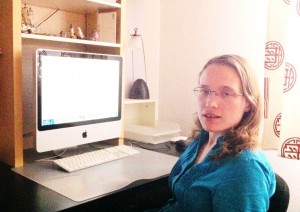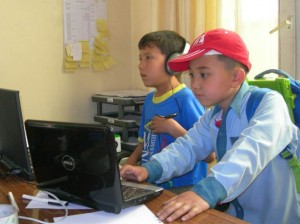Editor’s note: Selina Whiteley is a British national who graduated with a master’s degree in Peace and Conflict Studies from the University of Ulster in Northern Ireland. Northern Ireland is one of the model countries that in the last decade or so has managed to overcome centuries of sectarian violence and hatred and to establish reconciliation and peace within its borders. Selina combines her skills as a peacemaker with her extensive experience as an English as a Second Language teacher. She embodies the skills and spirit that make her just right for our Pax Populi English Tutoring program. We are very grateful to have Selina’s participation in our initiative. In the following essay, Selina shares her thoughts on Pax Populi and her work as a tutor with two Afghan boys, one age 9 and the other 11, who are both students at a school in Kabul with which Pax Populi has recently begun partnering.
“Accommodation can only come through dialogue…Building peace requires a continuous and ongoing effort to build relationships, to dialogue, to outreach, to go the extra mile for peace…The Peace Process moved us from the tragedy of conflict to an era of dialogue, negotiation and a new political dispensation.â€
These are the words of Deputy First Minister, Martin McGuiness, once, allegedly, the Commander-in-Chief of the Irish Republican Army. The majority in Northern Ireland concur: peace only comes through intercultural dialogue.
With MediationNorthernIreland, I worked on the District Policing Partnerships, aiming to resolve the distrust the Catholic community felt toward the former Royal Ulster Constabulary, the northern Ireland police force that had violated human rights and even colluded with Loyalists in the killing of Catholic civilians. The mediative dialogues helped the most impoverished communities in Northern Ireland to emerge from a form of community policing linked to paramilitary organizations. These District Policing Partnerships, trailed between 2006 – 2009 have been accredited with inspiring Sinn Féin MLA Alex Maskey to agree to the devolution of policing powers.
Other organizations in Northern Ireland, such as the Peace People, have shown that when we empathize with people and accept that there can be reciprocal learning, we can build the most fantastic and durable of friendships. Much of the work I have done with AIDS charities too has shown me that those who can be so unjustly treated as pariahs, have as much, often more to offer than the socially accepted.
I am infinitely proud of my city of residence, Toulouse. In the aftermath of a shooting spree by a violent Islamist extremist, France reached out to all Muslims and the vast majority reciprocated. It might not be too much of an exaggeration to say this is a city more dedicated to peace and to the French values of “libertie, egalitie, fraternitie†because of what was suffered. This could be the future of many other cities and that undoubtedly includes Kabul. Yet today, those who fail to see its abundant potential treat Afghanistan with suspicion and even contempt.
However, intercultural dialogue does not work in isolation. In Northern Ireland, where I spent all my adult life, there was conflict that stretched back for generations between our Protestant and Catholic forefathers. My compatriot, the Nobel Laureate, John Hume, explained that higher levels of education allowed Catholics to take a bigger role in the administration of the state, and in doing so, they became stake-holders. Slowly, better education also led to the consolidation of Civil Rights, and with greater affluence people also came to fear that escalating violence could potentially destroy more financially secure futures
The parallels between Afghanistan and Northern Ireland are manifold, but just as Northern Ireland’s Mourne Mountains are dwarfed in comparison to Afghanistan’s Spinghar, Kamir and Karakoram Range, so too are the impediments to peace in Afghanistan far larger than those of Northern Ireland. However, as Dr. Robert E. McNulty has stated, Afghans have the same need for higher-levels of education and economic development as the rest of the human community. Nothing supersedes the importance of education in being able to secure social justice.
Even in war torn Syria, where, whilst the infrastructure remains intact, there have been triple the number of killed in the 2011-2012 period, students of Damascus University celebrate the chance of learning English. A postgraduate explained, “I think here in Syria and in any country around the world having an education is an asset for every person but the differences between developed countries and developing countries is the scientific, administrative and social infrastructure which will determine the importance of education. You should put the educated in an administrative position to help in rebuilding and reshaping of infrastructure and not let the general ambiance affect on their performance and behaviour. No one can ignore nowadays the widespread importance of English.†Yet to install these qualified persons, an access to education is imperative.
I am, at present, actively participating in a project to allow the youth of Villa Fátima, one of the most impoverished barrios in Buenos Aries, Argentina, to achieve a university education. Argentina’s past, like Afghanistan’s, is filled with human rights violations but such violations are not Argentina’s present. They do not have to be Afghanistan’s future. Volunteering for a Martin Luther King Jr Memorial Foundation Cameroon project to create a nursery school dedicated to the promotion of peace and human rights, my belief that even the youngest children can be nurtured in the values of peace has been reinforced. My youngest student, at nine, like many children of his age, is inquisitive concerning other cultures and embraces our intercultural dialogue, describing Afghanistan and listening intently to descriptions of France. Afghans deserve the same chance of a peaceful future and that is what Pax Populi’s Tutoring program allows.
I am an accredited Teaching English as a Foreign Language (TEFL) tutor with experience teaching English to French BAC students, asylum seekers and, via Skype with impoverished students in Madagascar, a land of increasing violence, and Honduras, another nation that has transcended a legacy of conflict. I wanted to use my skills to benefit the Afghan people and, now, through the Pax Populi English Tutoring program I am able to do so. That is one of the greatest honors available to me.
Pax Populi is essential in helping Afghans to develop self-governance. Earlier in my career, when helping MedIRAQ to establish a hospital in Kirkuk in 2003, I saw how otherwise superbly qualified doctors, who lacked the English proficiency to deal with foreigners, could not deliver a satisfactory health system. They needed an English program such as that provided through Pax Populi.
According to the lecturers, the English Literature program at Al Aqsa University in Gaza has over many decades helped to lessen Gaza’s sense of isolation and to teach Gazans about English culture even as conditions have progressively worsened. Pax Populi is, by tutoring Afghans via Skype, helping to overcome the paralyzing sense of isolation felt by many Afghans, and to give them a sense of optimism as they endure the heartache of war. It also gives them the tools to facilitate intercultural dialogues, even long distance friendships.
My oldest student is just 11-years-old yet his dedication to learning English evidences an almost adult studiousness and maturity. The following are some of the words he wrote: “We need to make large steps and help our society to have a better world. We will need literacy. We will need to improve schools to become good students and better help illiterate peoples. We need to help the people who are not in that state which we are. We need to have brotherhood and not to fight with one another.†That is what Pax Populi is helping to achieve.


4 Comments
Selina Whiteley · July 25, 2012 at 6:39 am
Pax Populi is always looking to expand our relationships with other organizations that focus on advancing peace and human rights in various nations. It is central to our ethos to be able build-up a network of peacemakers from across the globe.
For this reason, we have developed links with various educators. These include Fuad Giacaman, Director of the Arab Education Institute in the PNA, Abdul Warfi, Peace and Human Rights Foundation for Somalia and the Horn of Africa (an NGO that facilitates courses in the Dadaab Refugee camp via the African Rescue Committee) and the African Peace Institute which works in various conflict torn nations in Africa.
In the same vein, we are currently organizing seminars that will include a youth roundtable with students from the Dadaab Refugee Camp, the PNA, Uzbekistan, India, Mexico and hopefully many other nations afflicted by conflict. We are in particular reaching out to organizations in Iraq and Northern Ireland. With regard to Northern Ireland, since the roundtable is also a way of developing English skills, we believe it would be most beneficial to children taking GCSE Citizenship. We hope to seek further advice from NICE and CRIS amongst others.
I hope this goes a little way to answering your question and should you have any further questions, please do not hesitate to contact me. My direct email is Selinawhiteley@gmail.com.
Margo Gorman · July 25, 2012 at 5:56 am
I would be interested in learning about how Pax Populi networks with other organisations working on education as part of a peace process.
Louise Groarke · May 15, 2012 at 12:16 pm
Selina, I think you as a person, and the work you do is amazing. I am so proud and lucky to have you as a friend xxxx
Danielle Bonner · May 9, 2012 at 10:15 am
Really lovely written piece, your work is invaluable, keep up all the good work 🙂